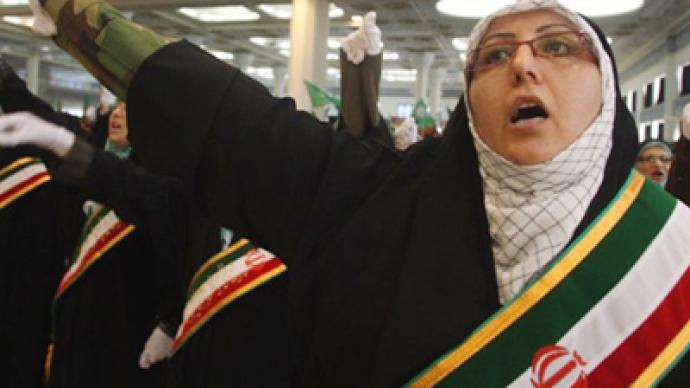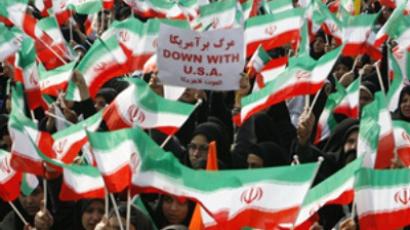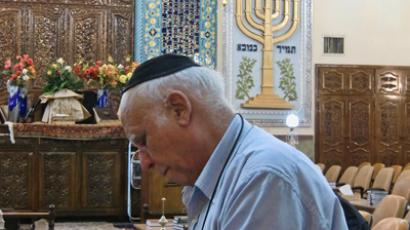12 million volunteers

They do not give interviews to Western TV channels. Some mention them as a people’s militia, but the reality is much more complicated. Understanding Basijes is the key to understanding modern Iran.
The name of this organization can be translated as “Mobilization of the Oppressed”. All members are volunteers. Basijes call their movement the largest NGO in the world – they currently have around 12 million members.Their reluctance to speak to Western media perhaps accounts for why those media brazenly attribute the most incredible characteristics and actions to the Basij. Some mention them as a people’s militia, but goes much deeper and is much more comprehensive than that.It is hard to understand the phenomenon of modern Iran without having talked to Basij.“Basij means being always ready,” says Sedigh Ghanadi. She is one of them for 30 years.“Being ready for what?” I ask her.“Ready to sacrifice your life for a sacred goal” 30 years ago, Sedigh Ghanadi’s husband was killed in the war with Iraq, leaving her alone with two children to raise.“The late Imam Khomeini said that a country with 20 million young people should have 20 million soldiers. Our country is an Islamic republic, and we follow the orders of our religious leader. It was his order and I fulfilled it, despite the fact that I lost my husband who became a Shahid,” Sedigh Ghanadi says.
I ask her to explain what it actually means that her husband is a Shahid.“Those fighting to defend the Islamic Republic and sacrificing their life become Shahids. Those who fight in Allah’s way and get killed become Shahids. The word is sacred to us. The Koran says that a Shahid is the highest title with God,” she explains.“I was under great psychological stress. I had two children, the older one being two-and-a-half years old. They, too, lost their father. But I heeded the call of our leader and joined the Basij,” says Sedigh Ghanadi.The call has not been totally fulfilled so far, as there are about 12 million volunteers today, meaning every sixth Iranian, five million of them being women. While remaining volunteers, the Basij take orders from the Revolutionary Guards, an elite corps of Iran’s military.For more pictures see RT gallerySedigh Ghanadi explains that she did not join the Basij out of revenge: “We Muslims don’t seek revenge. I joined the Basij following our leader’s call. Even during the war with Iraq we were simply defending our country; our goal was not revenge.”“My parents have been at the frontline several times – both my dad and my mom. Thank God, both of them are still alive. My mom blessed all her four daughters to marry Revolutionary Guards. Three of her sons-in-law were wounded; one of my brothers became a martyr, another one fought in the war, and the third one was only five years old at the time. Now he is a doctor and also a Basij,” Ghanadi continues.Sedigh Ghanadi had a rifle and knows how to use it.“Thank God we had enough men then. Women didn’t need to take up arms. Women at the frontline did two things: took care of cultural issues and supported our troops. We had rifles when we went to the frontline, but we did not use them. We carried our rifles when we went to town, too, but we never used them. I used to be a good shooter but I haven’t practices for a long time. I wasn’t a military instructor; I was a cultural instructor,” she says.
Towards the end of the war, she had to make a difficult choice.“As I was helping the wounded, I was thinking how I could help them once the war ended. I studied the issue. People with spinal damage were the most difficult patients. They would never be able to get out of their wheelchairs. One day, as we were handing out juice at hospital, I decided to marry a wounded soldier, so that I could take care of him as a nurse and so that my children have a father,” says Ghanadi.She married a paralyzed war veteran. Imam Khomeini blessed her marriage, and the current leader Khamenei said prayers at her wedding.She and her wheelchair-bound husband visited troops at the frontlines. When in Halabja, they both came under a poison gas attack launched by Saddam Hussein.They are now living in Mashhad. Her husband is a well-known expert in international law. Her son Nasyr is a Basij, working with his mother. She has four grandchildren.“Do you ever go to a shooting range these days?”“Not really. I’m more into intellectual things.” Sedigh Ghanadi is laughing. She finds it funny how journalists always depend on clichés: if you’re a Basij, you’ve got to be armed.“It is forbidden by the laws of our republic to keep weapons at home. But those Basij who are in the army, protecting strategic facilities or guarding the border, have modern weapons. Basij are always ready for active service. You can find Basij among people of every occupation — technicians, engineers, construction workers, doctors, etc. Basij are well-trained and ready to defend their country but at a time of peace they do regular civilian work,” she explains.She hugs her granddaughter and shows me pictures of her family. She knows how journalists are interested in the militia, especially in female Basij, so she suggests with a smile, “Do you want me to exercise in the rain so you can get a good picture? We have some exercise machines right outside our house.” (Tehran has a lot of exercise machines installed in streets and parks. They are there to promote a healthy lifestyle).
Indebted to people
“We saw a TV program about the Victory Museum in Moscow the other day. My wife told me that your newly-married couples often visit the tombs of fallen soldiers during their weddings. I wept when she told me about it. Many of your Communists were people of high moral standards,” says Reza Mahmoudi.He is blind. He volunteered when he was 13, spent four years at the frontline, was repeatedly wounded and every time returned to the front until, finally, he lost his eyesight. On top of that, he was seriously poisoned with mustard gas. His wife married him when he was already blind.
“Because of sanctions, we can’t get the medication we need. I am alive thanks to this,” Reza Mahmoudi shows an inhaler with the word “Seretide” on it. “The Finnish company which used to import it no longer sells it here. If other companies have to leave too, I won’t be able to survive — and not just me, but thousands of people poisoned in gas attacks.”“I wanted to give my life to my people. I lost my eyesight but survived, which means I am indebted to my people. I tell young Basij why I volunteered and how we were able to stand firm when the whole world was against us. Blind people can see things sighted people don’t notice. Let me assure you that our children, including my son, the son of a blind war veteran, will create our own S-300 instead of those Russia refused to supply to Iran. I lost my eyesight because of the weapons the Soviet Union supplied Saddam with. I am not surprised that Russia joined the sanctions. Decisions are made not by those people who visit the tombs of your Shahids on their wedding day. Iran is threatening no one. We have proclaimed, however, that we will overcome everything – and we will,” the blind veteran says.
Basij and nanotechnology
Mujtab Maliki and Varkesh Mouhammadjavat study construction engineering at the Amirkabir University of Technology, famous for its nuclear research and students’ riots.Both of them are members of a student Basij organization. Unlike war veterans, they do not mind being photographed.“Basij organizations vary greatly in terms of structure, management and culture. Our Basijes work with nanotechnology. We invite professors to lecture on the subject. We do study military and defense technology, but college Basij don’t have military organizations,” Maliki says.I ask if Basij have any privileges.“Privileges? Well, if you go through a military training course, your army term is reduced. There are no benefits in terms of finance or career. On the contrary, you spend time in the Basij, which means that in a sense you sacrifice your career. Basij put spiritual values above everything else,” Maliki answers.
Maliki was born into the family of a public employee. He comes from a town not far from Mashhad. Both of his sisters help the Basij, but they are too young to become regular members.“We don’t have uniforms apart from the uniform we use for military training. We also have a code of conduct. We don’t have an oath, but we have a Basij constitution. You accept it and follow it. We don’t have to ask our parents for permission to join the organization. My father used to be a Basij. He fought at the front and was wounded. But I made this decision myself,” says Maliki, 21.I ask what the shouts “Death to America” mean.“Those who are interested in politics join the Basij. The slogan “Death to America” does not have the meaning you attach to it; it does not encourage killing. It’s an expression of our attitude toward the US administration, which acts as an enemy of our country. We are against them but we are not against the American people. The United States wants to own the world; so naturally we want resist that. What about yourself? Do you want to surrender to America? There is a range of opinion in Iran, but all Iranians are against external threats. Should an external threat become real, all the Iranians will unite regardless of their differences,” the student says.
Nadezhda Kevorkova, RT














